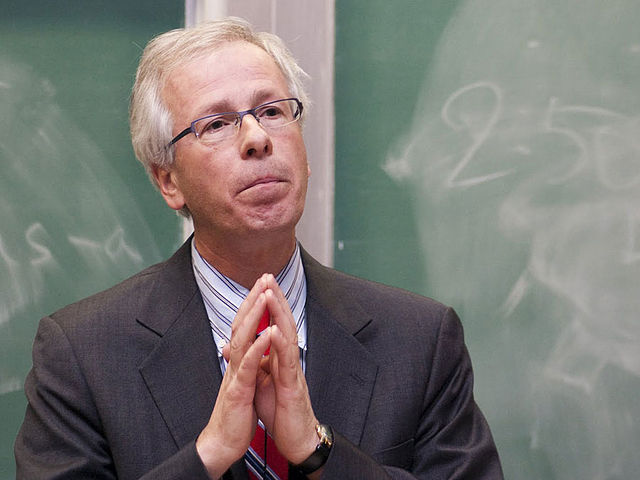Like this article? rabble is reader-supported journalism. Chip in to keep stories like these coming.
As violence continues to escalate in the Occupied Palestinian Territories and Israel with little end in sight, the Canadian government has finally released a statement on the matter. On January 24, Foreign Minister Stéphane Dion expressed the following:
“Canada believes strongly in a two-state solution and that negotiations provide the only viable path to peace. As a steadfast ally and friend to Israel, Canada calls for all efforts to be made to reduce violence and incitement and to help build the conditions for a return to the negotiating table.
“Unilateral actions, such as Palestinian initiatives toward statehood in international forums and continued Israeli settlements, are unhelpful and constitute serious obstacles to achieving a comprehensive, just and lasting peace.”
The statement, whilst certainly “outrageously vague”, was not entirely devoid of meaningful content — predictably, it did not fail to exemplify Canadian hypocrisy regarding prevailing government policy towards the Israel-Palestine conflict.
While Dion’s statement condemned “unilateral…Palestinian initiatives towards statehood” and spoke out in favor of “a comprehensive, just and lasting peace” it eschewed mention of the fact that Israel has long opposed the initiation of peace negotiations of any kind, with Canadian support.
In June 2014 the Palestinian Authority (PA) and Hamas, ruling in the West Bank and Gaza respectively, concluded an agreement establishing a Palestinian Unity Government. According to the respected Palestinian-Jordanian journalist Rami Khouri, the new government explicitly accepted three joint U.S.-Israeli preconditions for peace negotiations (preconditions which the Canadian government has long supported): “recognizing Israel, renouncing violence, and respecting previous Palestinian-Israeli agreements.”
Faced with a real possibility for “achieving a comprehensive, just and lasting peace,” Israel flatly rejected the Unity Government. Unlike the European Union, and even the United States, which chose to recognize the Palestinian government, then Canadian foreign minister John Baird expressed that Canada had “concerns” over the PA-Hamas reconciliation, adopting something of a “wait-and-see approach,” in effect tacitly accepting and supporting continued Israeli rejectionism.
Israel sought to undermine the Palestinian Unity Government’s “peace offensive,” first by running rampant in the West Bank under the pretext of the murder of three Israeli settlers by a militant cell, and then by killing some 2250 Palestinians, the vast majority of them civilians, during Operation Protective Edge in Gaza. The Canadian government quickly moved to lend diplomatic support for these actions. Stephen Harper pronounced that “Canada is unequivocally behind Israel. We support its right to defend itself, by itself.”
In short, when the Unity Government accepted all of the Israeli preconditions for negotiations, Canada initially ignored and then actively supported the violent Israeli undermining of the Palestinian efforts.
Those quick to defend Trudeau’s Liberals on the grounds that they ought not be held accountable for the policies of the previous government should recall that within a week of taking office, Trudeau had reported a “very positive” phone call with Israeli Prime Minister Benjamin Netanyahu and that Israeli ambassador to Canada Rafael Barak had expressed that he was “really reassured” as he didn’t “feel there will be a change on the substance” of Canada’s policy towards Israel.
Examination of the brief foreign policy record of the nascent Liberal government towards Israel indicates Barak’s statement to be entirely correct. In November 2015, less than a month after Trudeau’s election, Canada was one of only seven countries that opposed the “Peaceful settlement of the question of Palestine” resolution at the UN General Assembly.
The resolution calls for “the withdrawal of Israel from the Palestinian territory occupied since 1967, including East Jerusalem” and “the realization of the inalienable rights of the Palestinian people, primarily the right to self-determination and the right to their independent State.”
Implementation on the ground would almost certainly bring about “lasting peace” whilst ending the “continued Israeli settlements” that Canada purports to be concerned about. Moreover, the Liberals have eschewed any indication that they will enact any of the extremely reasonable policies advocated by groups like Canadians for Justice and Peace in the Middle East (CJPME). These include restoring Canadian funding, cut by the Harper government in 2012, of the United Nations Works and Relief Agency (UNWRA), which provides essential services to millions of Palestinian refugees.
For Dion to lecture Palestinians about “violence” and “peace” while his country assists in Israel’s systematic undermining of the latter and escalation of the former is outrageous and shameful.
But Canadians can rest assured that Foreign Minister Dion’s statement has not passed without mainstream criticism — two Tory MP’s, Peter Kent and Tony Clement, have condemned the statement as “unacceptable” because it “by omission, equates [Palestinian] terrorist attacks with Israeli settlement construction.”
Extrajudicial executions of Palestinians by IDF soldiers, well documented by the Israeli human rights organization B’tselem, do not, of course, constitute “terrorism”, for the simple reason that they are carried out by a powerful Canadian ally and not the victims of decades of dispossession and occupation.
Colter Louwerse is a political science student at the University of the Fraser Valley and a Palestinian solidarity activist.
Like this article? rabble is reader-supported journalism. Chip in to keep stories like these coming.
Image: Wikimedia Commons



